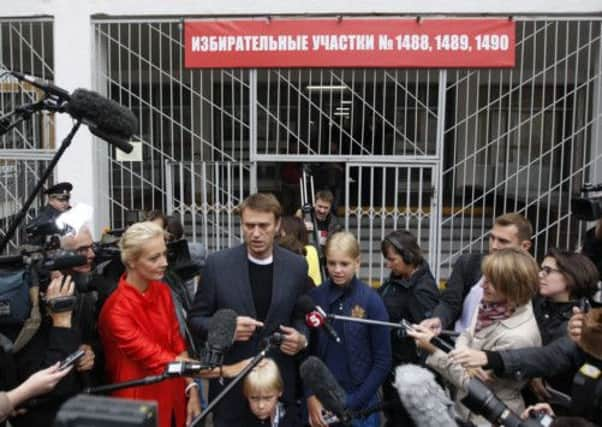Russia: Putin ally looks set to run Moscow


Two exit polls in Moscow’s mayoral election predicted a strong showing for opposition leader Alexei Navalny, putting him behind the Kremlin-backed incumbent but with the race far closer than expected.
But as election results began to trickle out more than two hours after polls closed, showing incumbent Mr Sobyanin with a clear majority, Mr Navalny said the slowness in reporting results and the lack of an official turnout figure raised suspicions that the vote was being manipulated
Advertisement
Hide AdAdvertisement
Hide AdThe contest between Mr Sobyanin and Mr Navalny has energised the small opposition in ways that could pose a risk to the Kremlin in the days and years ahead.
The candidacy of charismatic opposition leader Mr Navalny has prompted a burgeoning wave of grassroots campaigning by thousands of volunteers who had not engaged in a competitive race before.
He faces time in prison after being convicted of embezzlement, but he was released from custody before the mayoral race until his appeal can be heard.
Substantial support for Mr Navalny could embolden the opposition in its efforts to one day drive Putin from power.
While Mr Navalny has been allowed to run, he has been targeted by an increasingly dirty campaign, with election officials accusing him of being funded from abroad and state media giving little air time to his views.
Mr Navalny arrived at his local polling station early yesterday with his wife and children, saying he hoped there would not be any vote-rigging at the polls so that voters could choose “the political space they need for a new Moscow”.
Golos, Russia’s leading independent election monitor, said that there had not been evidence of major violations early on.
But they noted that many people coming to the polls who receive benefits or salaries from the state had clearly been forcefully encouraged to do so.
Advertisement
Hide AdAdvertisement
Hide AdOne woman demanded a document stating that she had voted, supposedly as proof for the state hospital where she worked, the group said.
Anna Grishina, a retiree who came out of the polling station soon after Mr Navalny, clutched her cane and said proudly that she had voted for Mr Sobyanin.
“I don’t see them,” she said, when asked about which changes Mr Sobyanin had brought to the city.
“But I hear about them on TV. He’s opened new metro stations and redone the roads. I can’t remember all of the things right now.”
Mr Navalny had built an online following through his anti-corruption blog, but it was 2011’s protests that cemented his status as de facto leader of the opposition. He led street marches that attracted tens of thousands of people from across the political spectrum.
The election is the first since 2003 and the first since the Kremlin last year reversed Mr Putin’s 2004 decree abolishing direct elections for the Moscow mayor and other regional leaders.
Since Putin returned to the presidency for a third term, the Kremlin has cracked down on the opposition and tried to stifle dissent. Mr Navalny was sentenced in July to five years in prison for embezzlement in a case that he and his supporters describe as legally dubious.